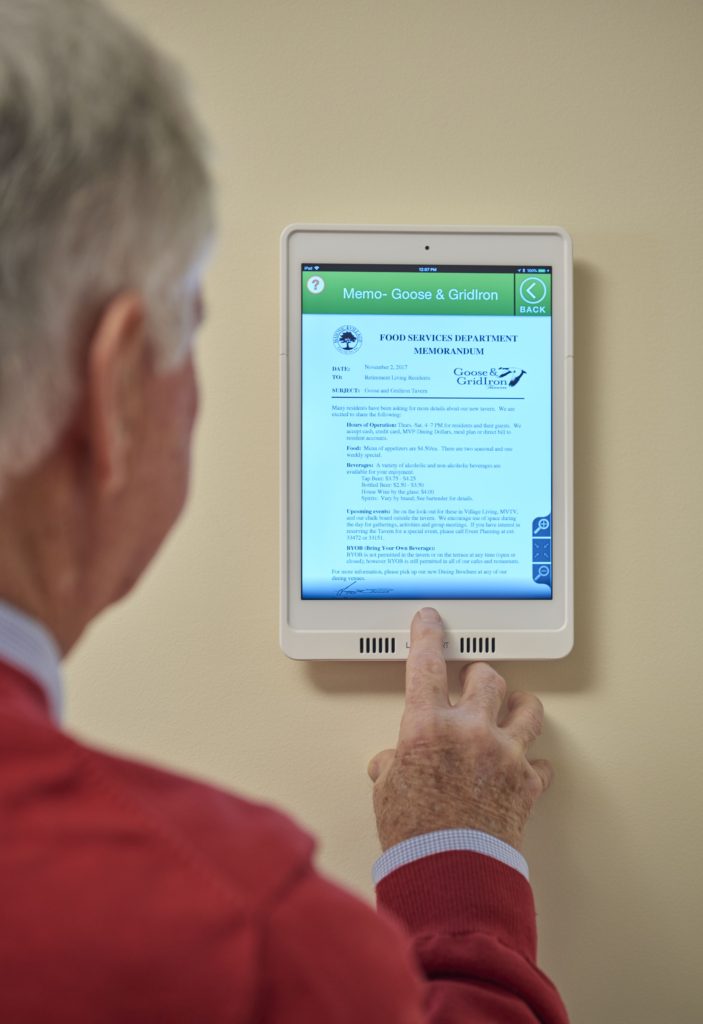IQ Home: Purpose-Driven Technology Keeps Residents Connected
November 8, 2018 The mindful combination of technology and design keeps residents connected to their social networks while fostering independence in senior living.
The mindful combination of technology and design keeps residents connected to their social networks while fostering independence in senior living.
Nearly 20% of Americans age 62–91 report feeling lonely frequently. – Connect2Affect report
It’s well documented that people who feel lonely are at greater health risk both physically and emotionally. Of the primary contributing factors to isolation, many are directly related to growing older, including relocation to a care setting, the death of older friends and family, the loss of hearing or vision and the decline of cognitive function and/or mobility. Together these create a perfect storm for older adults struggling to maintain a sense of social and community connectedness.
“Loneliness has been associated with increased mortality and a range of adverse health outcomes that are both prevalent and costly in older age,” notes a 2017 Connect2Affect report funded by the AARP Foundation. “Loneliness, however, is often a hidden problem. It has few clear outward indicators, some degree of stigma attached, and no proven solutions beyond conventional wisdom about trying to make friends and find meaningful pursuits and activities.”
Combatting loneliness is not just about interacting socially or participating in activities. The type of social connection matters, too, the study authors note. Healthy social connection works to raise a person’s self-esteem and sense of belonging while fostering emotional caring and the sense of purpose.
 While engaging in activities and making new friends both have value, the ability to maintain connection with already-familiar relationships is just as vital, notes a 2018 literature review published in BMC Geriatrics.
While engaging in activities and making new friends both have value, the ability to maintain connection with already-familiar relationships is just as vital, notes a 2018 literature review published in BMC Geriatrics.
Several of the studies reviewed touted the merits of technology-based connectivity that goes beyond email and telephone. Tools such as video-conferencing and online groups can bridge the gaps between static communication and in-person interactions. Other key interventions to combat loneliness include learning new things (courses, workshops, skills classes) and participating in purposeful activities (charities, volunteer work creating meaningful things to donate).
The IQ Home incorporates sophisticated technology into the living spaces, so friends, activities and community news are just a click away. Through a partnership with K4Connect, residents stay informed of campus happenings through a personalized portal, share video calls with grandchildren, participate in social media groups online and search for information whenever they wish.
Integrated connectivity for tablets, smartphones and other mobile devices helps create a sense of ubiquitous connection to anything they wish to access—making a resident’s own home a central hub for the “Internet of Things.”
The best ways to maintain healthy social connectivity are to stay in regular contact with existing family and friends, nurture family relationships to gain a sense of family support and inclusion and stay connected to the local community, whether it is by attending religious services, joining a community organization or participating in community events with family and friends.
IQ Homes put powerful technology tools in residents’ hands in a user-friendly form, giving them the ability to reach out and stay socially connected—all while supporting success in the independent lifestyle they have chosen.
To learn more about the IQ Home and its features for keeping residents connected to their friends and family, visit our IQ Homes Resource Page to download the free ebook, IQ Home: Purpose-Driven Technology Keeps Residents Connected.